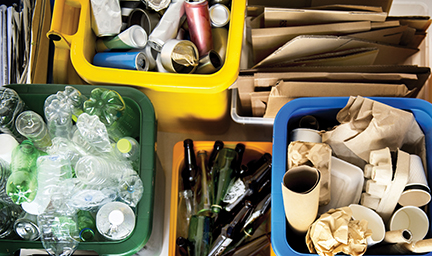A New Normal in Advanced Recycling After a Pandemic
By Dr. William Oliver Hedgepeth, American Public University
Who is recycling today during a pandemic? Who is processing recycled goods picked up at your home? In Ohio, the Ohio Recycling Coalition is closed as of March 2020, permanently. The closure of borders between the U.S. and Canada and across countries in Europe is impacting the movement and processing of recycled items. This had caused a business problem for residential, curbside, recycling companies. The current COVID-19 virus continues to compound the uncertainty of recycling. Remember that China stopped accepting recycled plastics from the U.S. in January 2018. At that time the U.S. had been shipping approximately 4,000 containers of plastics a day to China.
Advanced Recycling
One business innovation that was well established before the COVID-19 impact is advanced recycling of plastics. This business model allows plastics to be broken down into their basic chemical elements. Those chemicals become the raw materials at the start of a new manufacturing supply chain process. This innovation process is designed to help decrease the volume of plastics in landfills, rivers and oceans. There is a new plastic problem, however. The volume and different kinds of plastics were starting to cause a new problem for waste firm’s trash piles as well as advanced recycling.
In some states they make mandatory the banning of plastic bottles, as well as plastic bags and all kinds of plastic food containers and packaging from restaurants and other retail stores. This last part is where being a good steward of our community and cleaning up plastic trash might have a business livelihood problem. However, with the closing of restaurants and retail stores in March 2020 across the U.S., the quantity of such plastic trash has decreased. The closure of U.S. restaurants, keeping take out as the only business option, will decrease the replacement for the plastic items. That rate is unknown at this time and may have to wait for restaurants to fully reopen. But, even with this COVID-19 impact, this advanced recycling manufacturing approach has caught the attention of politicians.
U.S. Bans on Plastic Bags
As of January 2020, banning the use of plastics bags came in effect for California, Connecticut, Delaware, Hawaii, Maine, New York, Oregon and Vermont. Before March 2020, there was a cost for using plastic bags in some states when you go to the grocery store. In California this cost was a minimum of 10 cents for reusable plastic bags. Other states that charged you to use a plastic bag are Colorado, Maryland, New York, Maine and Washington, D.C. However, with the fear of promoting the spread of the coronavirus, stores are not allowing customers to reuse bags of any kind. The verdict is still out of how long this process or concern will last. The length of time of this COVID-19 impact on all commerce is a driving factor. It may be 2021 before stores have confidence in the previous bag policy, and it will not be just to save plastics from entering the landfill.

Impact to Restaurants
Before March 2020, the cost of replacing all plastic and Styrofoam restaurant eatery items such as forks, knives, spoons, cups, boxes, plates, straws was estimated to be 20 – 30% of revenue for each restaurant. This translates to that seafood platter or crab cake or hamburger or fried chicken dinner costing 2 – 3% more than today. The 2020 plan for most U.S. states was to replace plastics in restaurants is to use vegetable-based materials. Paper and especially recycled paper were no good either as there are now environmental problems with wastepaper in the rivers and lakes just as with plastics. There was and may still be a growing need to treat recycling as a new industry. The owner of a restaurant cannot do it. They could only place current recycled items in a curbside recycle container for pick up maybe three times a week. And that recycling company were raising the cost of pickup. And that company was also not recycling but taking the recycled items to the landfill and paying to do so. Is this problem one for the federal and statement governments to revisit when this pandemic is over? Yes. Watch for new senate bills in many states to address the needs of replacing plastics and recycling procedures and processing of plastics and other recycled items.
Need to Create a New Industry
There is a growing need to treat recycling as a new industry. The owner of a restaurant cannot do it, when they open back up after this pandemic. Again, they can only place current recycled items in a curbside recycle container for pick up maybe three times a week. And that recycling company is raising the cost of pickup now and will have to after this pandemic. And that company who is today also not recycling but taking the recycled items to the landfill and paying to do so, may continue for some time after the pandemic is over.
The federal and statement governments need to be part of this solution. So far, the federal government, Congress, Senate, the President of the U.S. are not engaged. It is time to start contacting your congressman for a new normal in advanced recycling.
 Dr. William Oliver Hedgepeth
Dr. William Oliver HedgepethDr. Oliver Hedgepeth is a full-time professor at American Public University (APU). He was program director of three academic programs: Reverse Logistics Management, Transportation and Logistics Management and Government Contracting. He was Chair of the Logistics Department at the University of Alaska Anchorage. Dr. Hedgepeth was the founding Director of the Army’s Artificial Intelligence Center for Logistics from 1985 to 1990, Fort Lee, Virginia.